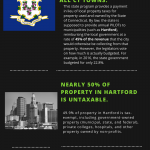
The State Property PILOT (Payment in Lieu of Taxes) requires our state to reimburse municipalities for the tax loss on tax-exempt state property. The vital PILOT funds go into Hartford’s general fund to ensure that the city has the ability to properly manage service for its residents.
Why did our team research State Property PILOT?
Since the state of Connecticut sets different reimbursement rates depending on property revaluations or legislative decisions our community partner asked our team come up with plausible messaging strategies to encourage Connecticut residents to support funding State-Property PILOT for the city of Hartford.
PILOT Reimbursement Rates
The state does not reimburse cities for the full amount of taxes lost due to tax exemption. Rather, the state pays a pre-determined percentage based on land use. Prisons and related land uses are reimbursed at 100%, the Connecticut Valley Hospital in Middletown is reimbursed at 65%, and all other state-owned land is reimbursed at 45% of the property taxes that would be owed on a similar parcel. However, the state rarely reimburses cities to the legally mandated rate, which is already a fraction of the potential tax revenue.
Why is State Property PILOT important for Hartford?
As the capital city, Hartford is host to many buildings that are tax-exempt, including: state and federal buildings, hospitals, a county jail, colleges, and many not-for-profit organizations. All told, nearly 50% of Hartford’s parcels are tax exempt. Subsequently, Hartford has a commercial mill rate of 74.29– which is among the highest in the state. The “mill rate” is a metric used to represent the amount per $1,000 of the assessed property value (e.g. If a property is assessed to be worth $100,000, its mill rate would be 100).
This creates financial stress that forces the city to provide “bare-bones” services to Hartford residents. This also has an increasingly negative effect on surrounding towns that rely on a strong capital city to attract talent to work and live.
Since the state of Connecticut sets different reimbursement rates depending on property revaluations or legislative decisions; our community partner asked our team come up with plausible messaging strategies to encourage Connecticut’s suburban residents to support funding State-Property PILOT for the city of Hartford. Suburban residents are significant in their power to inform and influence representatives; if suburbanites cultivate a better understanding of PILOT via our messaging strategies, the more likely they will be to support PILOT, not only in theory, but in action as well.
Hartford State-Property funding compared to other municipalities
The funding issue is not just prevalent to this current year. There has been a trend by our state legislature that has affected other towns. However, according to the Office of Fiscal Analysis for year 2016 our graphs below portrays the amount of monies reimbursed by our Connecticut General Assembly to municipalities such as: Hartford, Bridgeport, and New Haven.
Data on the issue of PILOT funding concludes that all cities in Connecticut receive significantly less than they are owed. However, the amount of PILOT funds that Hartford is owed is much larger than its surrounding cities. Additionally, the lack of PILOT funds hurts Hartford the most; for 2016, Hartford was expecting to receive $30,105,374, but only received $10,162,953. This means Hartford has around $20million less available to put towards areas such as infrastructure, education, and public attractions.
